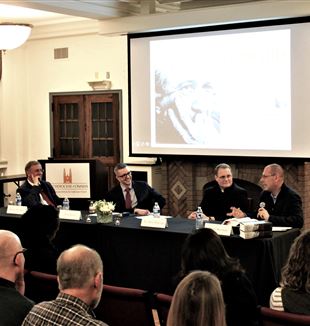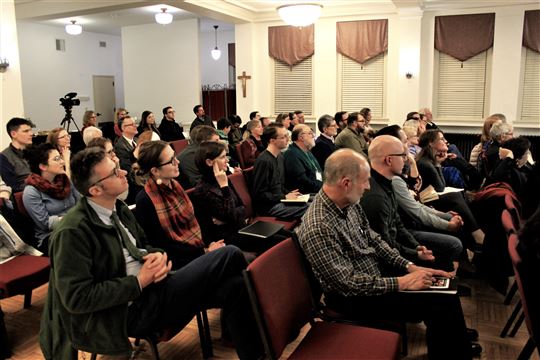
The Life of Luigi Giussani: Christ, Yes or No?
On March 14 in Omaha, Nebraska, Alberto Savorana continued his ten-day book tour. The panel was comprised of Michael Waldstein, Very Rev. Scott Hastings, and David Hazen. Read the full story.“Christ, yes or no?” The question of Msgr. Luigi Giussani echoed through the Archdiocesan Retreat and Conference Center in Omaha, Nebraska, where the fifth Life of Luigi Giussani panel took place on March 14. The event, convened to highlight the newly published English edition of Alberto Savorana’s acclaimed biography, The Life of Luigi Giussani, was preceded by a short video featuring Giussani briefly exposing the genesis of Communion and Liberation.
First to speak was Michael Waldstein, professor of New Testament at Franciscan University of Steubenville. It is always wonderful to hear the testimony of those who have personally met Giussani, but Waldstein’s extensive experience with the founder of Communion and Liberation was a vicariously magnificent encounter. “[Giussani] spoke of the sense of longing. It goes beyond any finite thing you realize, but that longing is in fact here: it is the glory of Christ present now,” exclaimed Waldstein, who in an apropos fashion went on to connect the tumultuous and scandalous disposition the Church is currently wading through with the Italian student protests of 1968. He stated that, “if the Catholic Church were supposed to preach morals only, then we would have no ground to stand on--the Church would be nonexistent. But the Church announces Christ who died for our sins.” Responding to the perpetually problematic paradigm of avoidance, that is, the “I cannot wait to leave this world for the next,” or any variable version of it, Waldstein concluded with a lesson from Giussani himself: “Christ is the center of meaning, the only answer to the longing of the human heart,” and thus this world has its very own meaning as well.
Following was the Very Rev. Scott Hastings, Vicar for Clergy and Judicial Vicar for the Archdiocese of Omaha. Hastings began by disclosing the evident fact that “the priesthood is a source of joy in [his] life and [he] love[s] being a priest. … [He] would not change that for anything.” That disclosure was vital because, as he explained, his dual role of Vicar for Clergy--being the functional equivalent of Human Resources director of the Archdiocese--and Judicial Vicar -- “as the direct descendant of the Inquisition” -- is one in which he “is not very often invited to priests’ parties.” Turning to the current stormy situation the Church is facing, Hastings traversed through statistics exposing Church membership, participation, reception of the sacraments, and rates at which Catholics are fleeing the Church: “It seems to me that we see a Church in decline. We live in a world which inculcates the notion of ‘us’ versus ‘them.’ We see suspicion everywhere. However,” he continued, “I just told you that it is my experience that my life is full of joy and my life as a priest is joyful. How can this be when it seems that the Church seems to be on fire?” Pausing for a moment for our own consideration, Hastings flashed onto the screen only one of the numerous quotations Giussani has given us: “Mercy is the word that defines, in the clearest way possible, the face of God in our lives.” Referring to this statement, he explained that joy is possible because, paradoxically, while God does not need us for anything, He looks for us regardless and He looks at us with mercy. In fact, “He seeks us … as He did with Zacchaeus, with the Apostles who were just mere fishermen, and even before he ascended to the Father, [Jesus] even sought out the Apostles hiding in the upper room.” Thus, following Giussani’s example, “We can find God even in the fleeting and trivial circumstances in our life because [t]he method of Christ,” as Hastings pointed out, “is that He enters into even the ordinary circumstances, into our ordinary lives just as much as the extraordinary.” And so, to see mercy is to see Him.
Concluding his remarks, Hastings referred back to his original question: “I just told you that it is my experience that my life is full of joy and my life as a priest is joyful. How can this be when … the Church seems to be on fire?” He shifted to the last slide of his presentation with a photo of the Omaha community on one of its many communal excursions. “I’m here to tell you that my life is filled with joy because I know Jesus and the place where I meet him, most of the time, is here. These people are for me a sliver of Heaven.”
The final speaker was Savorana, who picked up points from the preceding panelists stating, “The method is the same: there is some person, for whom Christ is the joy of their life, and this is the showing of Christ. One of Giussani’s many accomplishments … was that he learned how to encounter the other.” Contributing a response to the current crisis in the Church, Savorana marvelously pointed out the already well-established fact that we, in fact, can still feel joy even in the face of the hardships and perils so many of us frequently face. According to Savorana, Christ was “[Giussani’s] life, the object of [his] preference,” and he cried for the eternal and ultimate happiness of humanity. However, what Giussani understood and, thanks be to God, undertook for all of us, came from his awareness that “Christ [chose him] to communicate the joy and life of … Christ.” Savorana concluded his talk posing the very question Giussani asked at the end of the introductory video: “Christ, yes or no?”#LifeLuigiGiussani